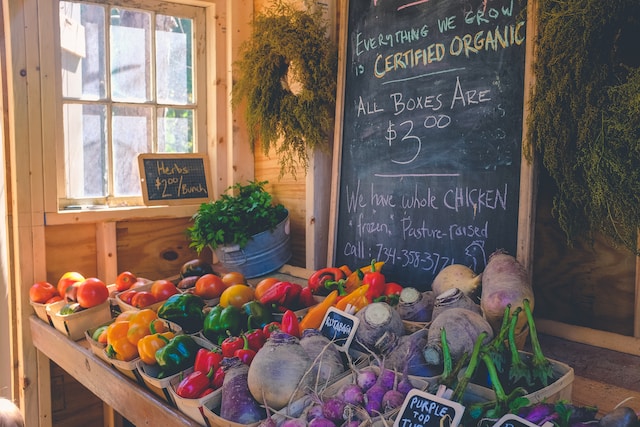Only a few decades ago, organic foods were found solely in health foods or at farmer’s markets. Today, the organic industry’s annual growth is consistently outpacing the growth of total food sales and gaining its share of the market. More than $28 billion dollars worth of organic products are now sold in North America each year. Consumers are clearly willing to spend more money for organic foods, which have improved in quality and variety in recent years. But what are we as shoppers getting for the money?
The meaning of “certified organic”
Organic food is produced by farmers who protect the environment for future generations by rotating crops and promoting biological diversity, conserving and renewing the soil, and protecting sources of water. These crops are grown, handled and processed without synthetic fertilizers, pesticides or herbicides, artificial ingredients, or preservatives. By law, organic food is not irradiated, and if the product is labelled “100% organic”, it is also doesn’t contain genetically engineered ingredients. Organic meat, poultry, eggs and dairy products come from animals that are given no antibiotics or growth hormones so it is considered more healthy.
Organic food crops can, however, be grown with pesticides – just not synthetic ones. And not all organic pesticides are harmless. Pyrethrins, for example, are natural insecticides isolated from flowers and can cause allergic reactions. Naturally occurring copper compounds can also be used in organic agriculture, even though they are potentially toxic to human.
Are organic foods more nutritious?
Some other research indicates that organic foods appear to have consistently higher levels of antioxidants so the debate is sure to continue. But remember, the ‘”certified organic” label is not a nutrition claim, and just because a food is organic does not automatically means it’s healthy. Organic meat is just as high in saturated fat as conventionally raised kind, and organic sugar adds just as many calories as regular table sugar.
Are organic foods safer?
While organic foods can still be contaminated with synthetic agricultural chemicals that persist in the soil or are introduced during warehousing, in one study of 94,000 food samples from more than 20 major food crops, sponsored by nonprofit Consumers Union, organically grown foods had about one-third the residues of conventional grown foods. But it’s unclear whether these residues are harmful to consumers.
There may be a greater benefit in shielding children from pesticide residues since their bodies are smaller and they eat a less-varied diet. Organic foods tend to be processed less, so they may likely to be contaminated, but they are not immune to foodborne pathogens.
Quick guide when buying organic
Because organically grown food is typically more expensive, it makes sense to shop selectively. Although there is no evidence that fruits and vegetables with higher residues (as identified by nonprofit research groups such as Consumer Union and the Environmental Working Group) pose a hazard. Selecting the organic versions of these foods is a logical place to start.
Here is a list of vegetables you should buy organic only:
Apples, strawberries, spinach, imported grapes, potatoes, lettuce, celery, peaches, imported nectarines, sweet bell peppers, domestic blueberries, kale and collard greens.
Here is a list of vegetables if want to save money with nonorganic low residue foods:
Onions, pineapples, asparagus, mangoes, cabbage, sweet potatoes, mushrooms, avocados, sweet peas, eggplants, cantaloupes, kiwifruit, watermelons, grapefruits.
Finally, consider consuming organic meat. While most people worry about produce, animals actually accumulate residues from the foods they eat. All toxins are stored in their fat. So you may want to buy organic hamburger, steak, pork chops, and lamb to avoid a more concentrated exposure to various harmful nonorganic chemicals.
To reduce pesticide exposure, fruits and vegetables should be washed under running water prior to eating or cooking. Scrub with a brush when appropriate. Do not use soap, but use baking soda instead.
Bottom line on organic food
Organic foods are grown or processed without synthetic pesticides, fertilizer or herbicides. Organic foods also do not contain artificial ingredients or preservatives. Pesticide levels in organic foods are about one-third of conventionally grown foods. Children may benefit the most from eating organic foods. Food labeled “100% organic” can’t be irradiated or contain genetically modified ingredients. Organic food confers the same level of nutrition as conventionally grown foods. So while you don’t need to spend thousands to go all-organic, it can’t hurt to take a few precautions to lower your exposure to pesticides and other chemicals. Next time include “certified organic” food into your groceries bag!





